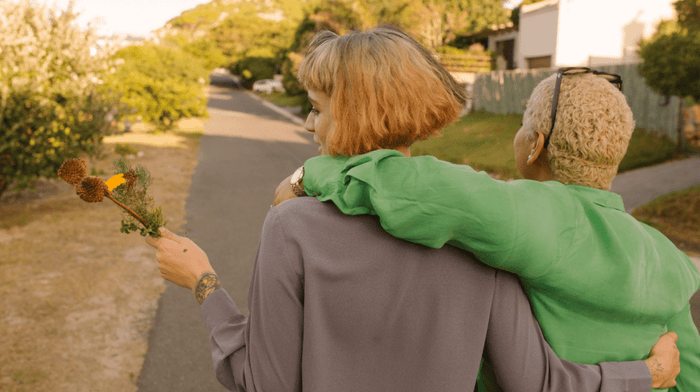
Most of us will experience low mood at some point in our lives and this may be due to a variety of reasons.
Symptoms of low mood may include reduced energy levels, sadness, worry or anger and a combination of psychological, societal as well as biological aspects all interplay in determining whether a person might experience low mood. Because of this multifactorial influence upon mood, it would seem logical that making holistic changes to our lifestyle could potentially improve our mood.
Below are some suggestions on how to lift your mood naturally.
LAUGHTER YOGA
Laughing is a physiological response that is widely acknowledged to have psychological benefits. Although there are many different theories as to why we laugh (e.g. a physical manifestation of repressed motivations or a reinforcement of self-esteem), benefits are apparent for improving depressive symptoms, anxiety and stress.[1]
We're sure you are familiar with the well-known phrase 'Laughter is the best medicine'. It was due to laughter’s ability to heal that prompted an Indian doctor to start laughter yoga in the mid-90s. This form of yoga is about deep breathing exercises and playful laughter. There are lots of videos online or find a local group at www.laughterassociation.com.
RANDOM ACTS OF KINDNESS
Research has shown that doing things for others can stop us focusing on our own worries and boost our mood. Research has even shown benefits to toddlers from acts of altruism.[2]

It could just be a small thank you or a passing smile. It may be a kind gesture such as planting seeds in a pot for a friend or neighbour. There are lots of suggestions at www.randomactsofkindness.org.
You could also consider volunteering. Volunteering provides a potentially new environment and opportunity to meet new people, often with goal-oriented activities, such as raising money, awareness or helping others for a particular cause.
This may sound a little strange to consider if you’re feeling low, but when a group of people all work for the same outcome, it may help to re-prioritise your thoughts and create new social relationships at the same time. A large study has suggested that volunteering may benefit mental health by having favourable impacts on depression, life satisfaction and wellbeing.[3]
PRIORITISE ‘ME TIME’
Rest is an imperative element of physical and mental health.[4] The activity of resting does not necessarily mean idleness, but rather an activity that is personal to you and involves a change from a previous state.[5]
Scrolling through social media may not be a true restful activity however, as it may still trigger insecurities and have you ‘striving for the impossible’. There are a whole range of activities to choose from, for example reading, listening to music, watching a film, or those more physical activities such as yoga, stretching, gardening or walking.
Of course, simply doing nothing is something that we may not be all too familiar with, however it may take as little as 10 seconds or a full meditation session to get that moment of peace and clarity.
GUT HEALTH
The microbiota-gut-brain axis is a rapidly growing area of research and is concerned with gut bacteria and other microorganisms, their communication with the body’s immune, hormonal and nervous system and consequent influence upon the brain.
Consuming foods that are traditionally fermented such as kimchi, sauerkraut, kombucha and kefir have been suggested to provide a whole range of beneficial microorganisms to the gut.[6] Around 90% of our feel good neurotransmitter, serotonin, is manufactured in the gut, so have a go at trying some new fermented foods.
MOOD FOODS

The food that we eat and the way that we eat, may influence our mood. This may be familiar to you if you’ve ever been ‘hangry’! Drops in blood sugar can cause rises in the stress hormone cortisol and consuming refined carbohydrates and sweetened food or drinks may exacerbate this rollercoaster of energy and mood.
Opting for wholegrains and sufficient protein in your diet may help to temper blood sugar peaks and troughs and therefore improve mood.[7]
Consuming a variety of micronutrients may also support neurochemicals related to mood, for example B vitamins are found in many wholegrains, green leafy vegetables, meat, fish as well as nuts and seeds. B vitamins are required for the synthesis of neurotransmitters serotonin, noradrenaline and dopamine;[8][9] these are important for the regulation of mood, energy and the reward system.
KEEP A GRATITUDE DIARY
Getting your thoughts down and out of your head can be a quick and effective strategy for lifting mood. Positive psychology is a large and growing area of research, with some reported benefits to include having fewer physical symptoms, improved biological pathways (such as inflammation) and better interpersonal relationships and quality of life.[10]
So whether you write about something that is bothering you, or trying to answer a set or positive-related prompts (such as ‘what are you thankful for?’ or ‘what did someone else do for you’?) or simply jotting down any thoughts at all! On paper or laptop, getting your ideas out may help to organise thoughts and provide a different perspective.
ENJOY THE GREAT OUTDOORS

Exposure to nature and green space has been suggested to have a protective role on mental health.[11] A recent study found that spending at least 2 hours (or 120 minutes) a week in nature was associated with good health and wellbeing.[12] It didn’t matter whether this was done all in one day, or completed within several 20 minute walks each day.
Physical activity is also a well-documented benefit for stress-reduction in depression and anxiety.[13] So try factoring some outdoor physical activity into your day and perhaps plan to meet with a friend or family member and chat through what you’ve got going on.
Low mood will often pass in a few days or weeks, however if these feelings are continuous each day or persist over a period of time then it is best to talk to a healthcare professional to support you.
Written by Kim Plaza & Tracy Breuning
References
Louie D, Brook K, Frates E. The Laughter Prescription: A Tool for Lifestyle Medicine. Am J Lifestyle Med 2016; 10: 262.
Layous K, Nelson SK, Oberle E, Schonert-Reichl KA, Lyubomirsky S. Kindness Counts: Prompting Prosocial Behavior in Preadolescents Boosts Peer Acceptance and Well-Being. PLoS One2012; 7. DOI:10.1371/journal.pone.0051380.
Jenkinson CE, Dickens AP, Jones K, et al. Is volunteering a public health intervention? A systematic review and meta-analysis of the health and survival of volunteers. BMC Public Heal 2013 131 2013; 13: 1–10.
Hülsheger UR, Walkowiak A, Thommes MS. How can mindfulness be promoted? Workload and recovery experiences as antecedents of daily fluctuations in mindfulness. J Occup Organ Psychol 2018; 91: 261–84.
Asp M. Rest: A health-related phenomenon and concept in caring science. Glob Qual Nurs Res 2015; 2015: 1–8.
Melini F, Melini V, Luziatelli F, Ficca AG, Ruzzi M. Health-promoting components in fermented foods: An up-to-date systematic review. Nutrients. 2019; 11. DOI:10.3390/nu11051189.
Gangwisch JE, Hale L, Garcia L, et al. High glycemic index diet as a risk factor for depression: analyses from the Women’s Health Initiative. Am J Clin Nutr 2015; 102: 454.
Mitchell ES, Conus N, Kaput J. B vitamin polymorphisms and behavior: Evidence of associations with neurodevelopment, depression, schizophrenia, bipolar disorder and cognitive decline. Neurosci Biobehav Rev 2014; 47: 307–20.
Gao J, Cahill CM, Huang X, et al. S-Adenosyl Methionine and Transmethylation Pathways in Neuropsychiatric Diseases Throughout Life. Neurotherapeutics 2018; 15: 156–75.
Smyth JM, Johnson JA, Auer BJ, Lehman E, Talamo G, Sciamanna CN. Online Positive Affect Journaling in the Improvement of Mental Distress and Well-Being in General Medical Patients With Elevated Anxiety Symptoms: A Preliminary Randomized Controlled Trial. JMIR Ment Heal 2018; 5: e11290.
Gascon M, Sánchez-Benavides G, Dadvand P, et al. Long-term exposure to residential green and blue spaces and anxiety and depression in adults: A cross-sectional study. Environ Res 2018; 162: 231–9.
White MP, Alcock I, Grellier J, et al. Spending at least 120 minutes a week in nature is associated with good health and wellbeing. Sci Reports 2019 91 2019; 9: 1–11.
D’Alessio L, Korman GP, Sarudiansky M, et al. Reducing Allostatic Load in Depression and Anxiety Disorders: Physical Activity and Yoga Practice as Add-On Therapies. Front. Psychiatry. 2020; 11: 501.









